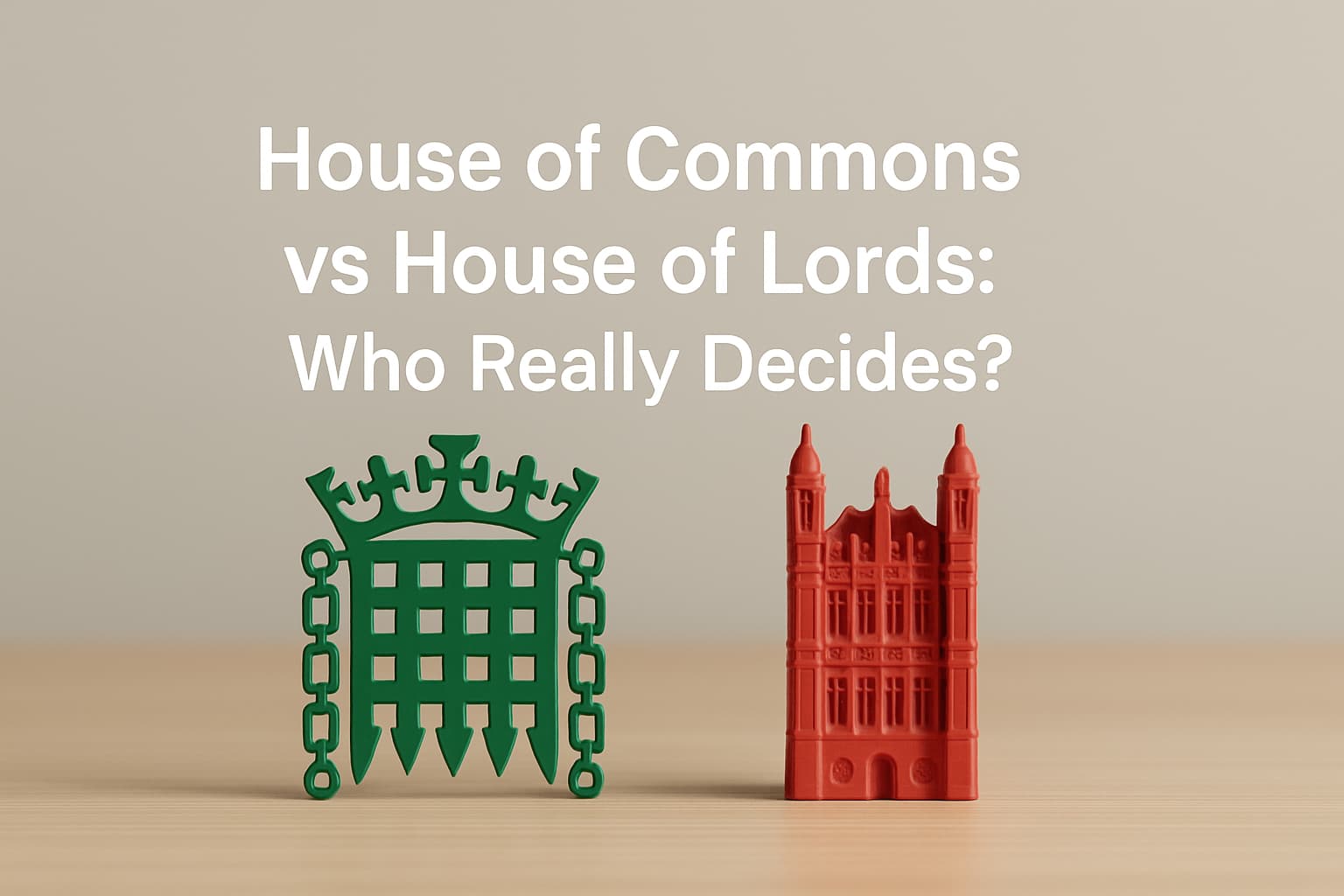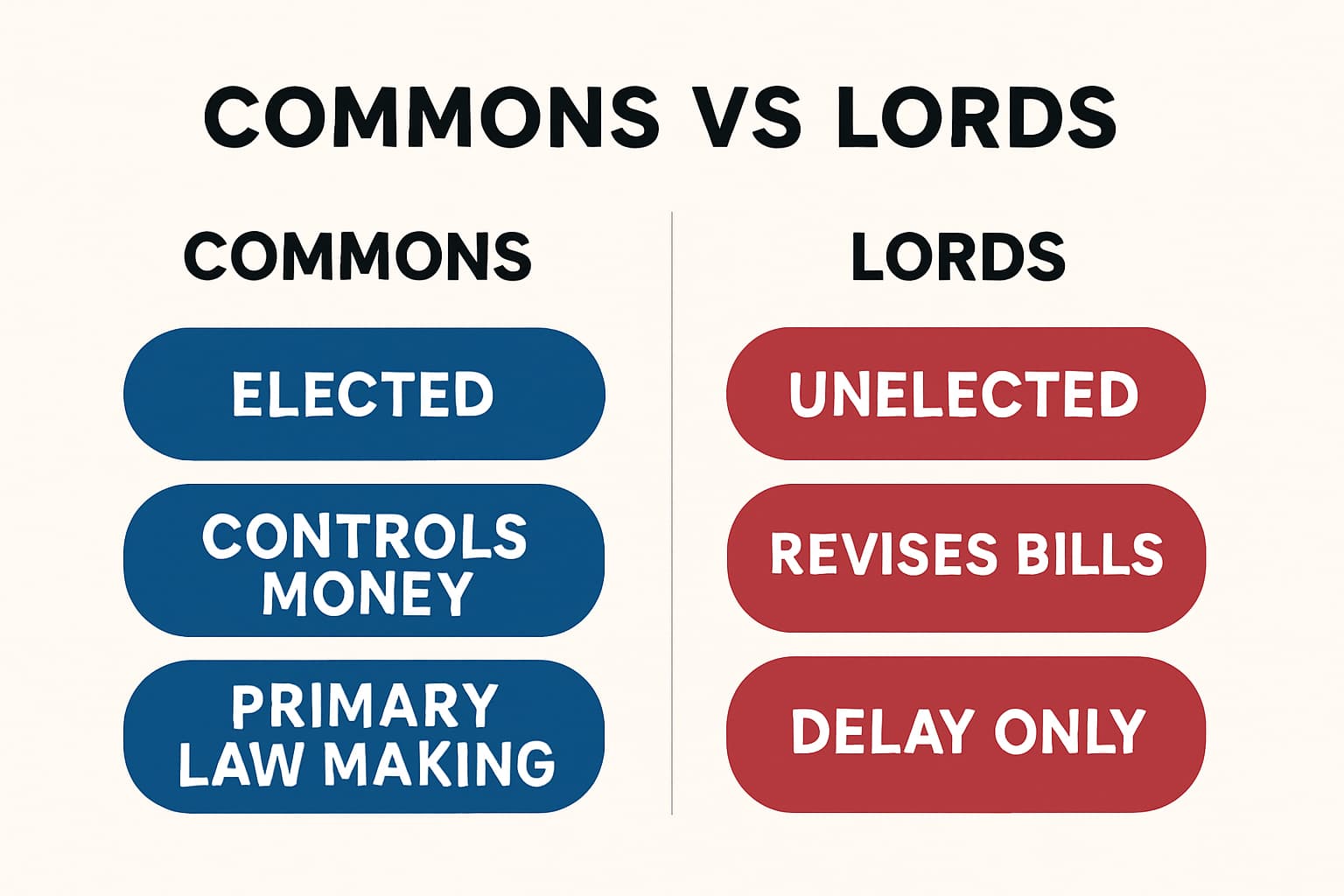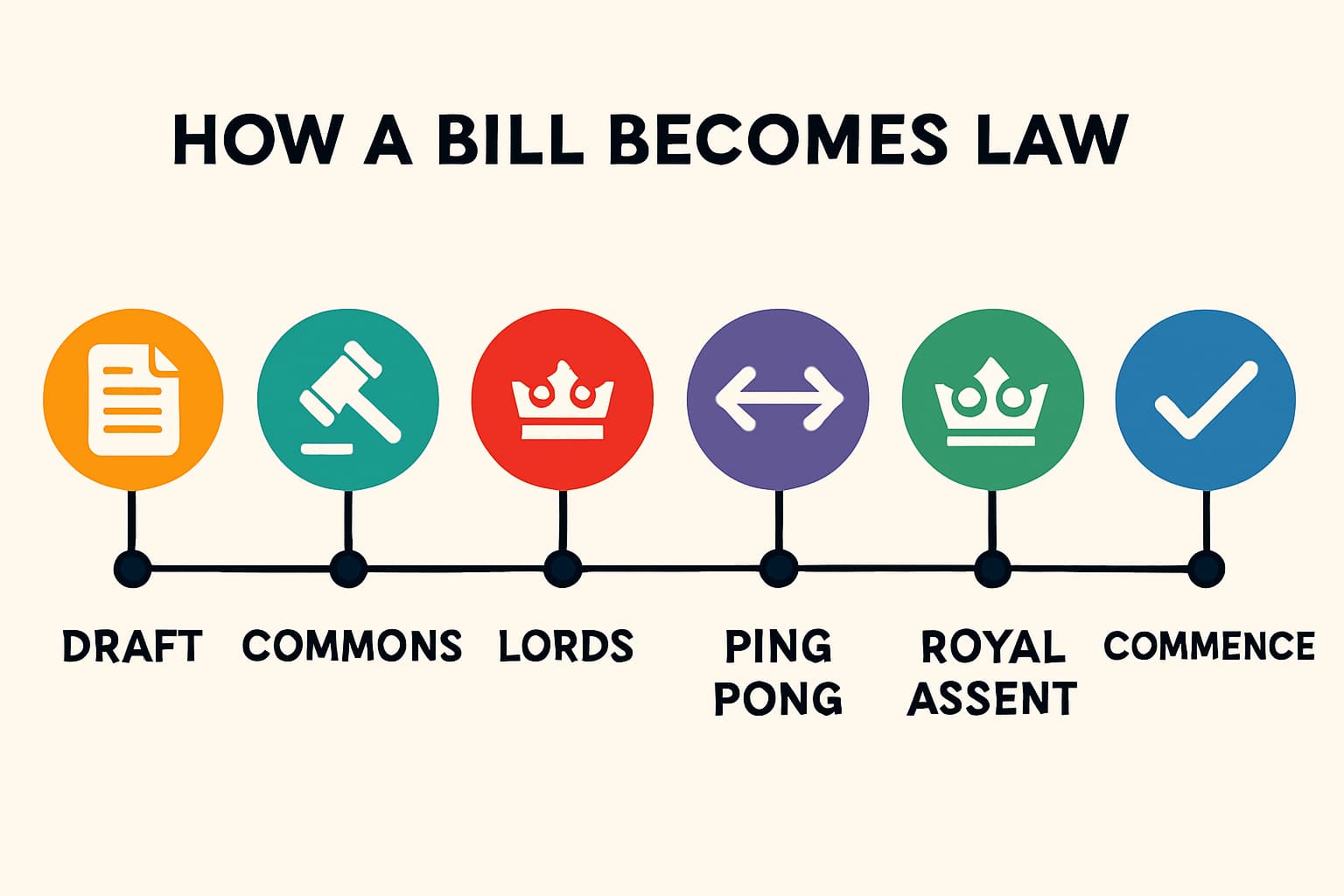House of Commons vs House of Lords: Who Really Decides?

Struggling to remember who does what in Parliament? This guide makes the House of Commons vs House of Lords crystal clear—so you score easy marks on the Life in the UK Test and understand how UK laws are actually made.
We’ll compare the two Houses side by side, show the step‑by‑step law‑making process, unpack real examples, and finish with quick facts you can memorise fast.
Why Parliament Matters for Your Life in the UK Test
The Life in the UK Test expects you to know the basics of UK Parliament, especially the difference between the two Houses and how laws are passed. This knowledge is also practical: it explains who holds the government to account and why some bills become law faster than others.
- Expect questions on House of Commons vs House of Lords, elections, and law‑making stages.
- Understand who controls money bills and why the Commons has primacy.
- Connect Parliament topics with wider citizenship themes like the constitutional monarchy and devolved institutions (see our guide to the Northern Ireland Assembly vs Welsh Senedd).
What You’ll Learn in This Guide
- The essential differences between the Commons and the Lords.
- How a bill becomes law in the UK, step by step.
- Key exam facts about MPs and peers you can recall on test day.
House of Commons vs House of Lords: The Essentials
In short: the House of Commons is the elected, primary law‑making chamber that controls public money; the House of Lords is an unelected revising chamber that improves bills and can delay—but not ultimately block—most laws.
| Feature | House of Commons | House of Lords |
|---|---|---|
| How members are chosen | Elected MPs (First Past the Post) | Appointed life peers, 26 bishops, 92 hereditary peers |
| Core role | Primary law‑making and approving taxation/spending | Revising and scrutinising legislation |
| Power over money bills | Has primacy; can certify money bills | Can only delay for one month |
| Ultimate say on most bills | Can prevail using the Parliament Acts in defined cases | Can delay and propose amendments |
| Accountability | To voters at general elections | To codes of conduct and public scrutiny |

What Each House Is For
The Commons proposes, debates, amends and passes most laws and controls the public finances. Governments must maintain the confidence of the Commons.
The Lords improves legislation through detailed, non‑partisan scrutiny. It suggests amendments, asks expert questions, and often fixes technical problems before laws take effect.
Democratic Legitimacy and Accountability
MPs are elected, so the Commons has the democratic mandate and bears direct accountability via general elections. The Lords is unelected, so it does not claim final say but adds expertise and revision. Its restraint is guided by conventions like the Salisbury Convention.
Composition and Selection (MPs and Peers)
- MPs: 650 Members of Parliament, each representing a constituency, elected by First Past the Post.
- Life peers: appointed for life; do not pass titles to descendants.
- Bishops: 26 senior Church of England bishops (the Lords Spiritual).
- Hereditary peers: 92 remain following reforms; vacancies filled by by‑elections among hereditary peers.
Learn how these parts fit with the monarch’s formal role in our guide: Constitutional monarchy made easy.
MPs and Peers: Roles, Routes, and Responsibilities
Both MPs and peers scrutinise government and legislation, but they reach their roles differently and focus on distinct tasks.
MPs: Elections, Constituencies, and Party Whips
- Elections: MPs are chosen in constituency contests using First Past the Post—whoever gets the most votes wins.
- Constituency work: MPs represent local residents, handle casework, and bring issues to Parliament.
- Party whips: Whips organise votes and maintain party discipline in the Commons, especially on budgets and major bills.
Peers: Life Peers, Bishops, and Hereditary Peers
- Life peers are appointed—often for expertise in law, medicine, business, or public service.
- Bishops contribute moral and social perspectives.
- Hereditary peers are limited to 92; they no longer inherit automatic seats beyond those elected internally.
Standards, Pay, and Conflicts of Interest
- Members follow codes of conduct and registers of interests to ensure transparency.
- MPs receive a salary; most peers claim allowances for attendance rather than a salary.
- Breaches can lead to sanctions recommended by standards committees.
How a Bill Becomes Law in the UK (Step-by-Step)
The UK legislative process is structured and public. Here’s the high‑level sequence you should memorise for the exam.
- Drafting and pre‑legislative scrutiny: policy is shaped in Green/White Papers and tested by committees.
- Introduction (First Reading): a formal presentation—no debate.
- Second Reading: the first main debate and vote on the bill’s principles.
- Committee Stage: line‑by‑line examination and amendments.
- Report Stage: further consideration and amendments by the whole House.
- Third Reading: final debate and vote in that House.
- Other House: the same stages repeat in the other chamber.
- ‘Ping‑pong’: Houses exchange amendments until agreement.
- Royal Assent: the monarch’s formal approval; the bill becomes an Act.
- Commencement: provisions come into force immediately or on set dates.
Drafting and Pre‑Legislative Scrutiny
Departments publish Green/White Papers to gather views and refine policy. Draft bills may be examined by joint committees before formal introduction, as described in the UK’s Guide to Making Legislation.
Commons Stages: 1st Reading to 3rd Reading
In the House of Commons, the bill moves through First Reading (formal), Second Reading (main debate), Committee (detailed scrutiny), Report (whole House review), and Third Reading (final vote).
Lords Stages: Revise and Refine
The House of Lords repeats these stages with a strong focus on clause‑by‑clause scrutiny and technical amendments, often improving clarity and legal workability.
‘Ping-Pong’ Between the Houses
When Houses disagree, they exchange amendments until compromise. If deadlock persists on certain public bills, the Commons can ultimately prevail using the Parliament Acts.
Royal Assent and Commencement
Once both Houses agree (or the Commons proceeds under the Parliament Acts), the bill receives Royal Assent and becomes law. Not all sections start immediately; commencement orders may phase implementation. For the monarch’s constitutional role, revisit our explainer on the constitutional monarchy.

Dig deeper with Parliament’s official overview of the passage of a bill.
When the Houses Disagree: Who Wins and How
Most disagreements are resolved by compromise. But the UK constitution sets clear rules when compromise fails.
Money Bills and the One‑Month Rule
Money bills (mainly taxation and public spending) are certified by the Commons Speaker. The Lords can delay these for no more than one month. See Parliament’s definition of a money bill and the Commons’ financial privilege.
The Parliament Acts 1911 and 1949
If the Lords repeatedly rejects a public bill (that is not a money bill), the Commons can, under conditions, present it for Royal Assent without Lords’ consent using the Parliament Act 1911 and the Parliament Act 1949.
The Salisbury Convention and Secondary Legislation
By convention, the Lords does not block bills that deliver a governing party’s manifesto commitments—the Salisbury Convention. For statutory instruments (delegated legislation), both Houses scrutinise procedure and merits, often under affirmative or negative procedures; see the House of Commons Library note on statutory instruments and parliamentary procedure.
Real Case Study: How the Online Safety Act 2023 Passed
The Online Safety Bill (now the Online Safety Act 2023) shows the Commons–Lords dynamic in practice. You can trace its full history on Parliament’s bill page here.
Introduction and Commons Stages
The bill aimed to regulate online platforms to reduce illegal content and improve user safety. In the Commons, it went through the standard stages—Second Reading debates on principles, detailed Committee scrutiny, and Report and Third Reading to refine and approve the text.
Lords Amendments and Compromise
In the Lords, peers scrutinised definitions, duties, and safeguards. Amendments focused on clarity, proportionality, and freedom of expression. Negotiations with the Commons led to compromises that balanced safety with rights and practicality.
Final Passage, Assent, and Implementation
After ‘ping‑pong’ on contentious clauses, both Houses agreed. The bill received Royal Assent in 2023, and commencement has been staged, with duties phased in over time via statutory instruments.
Parliamentary Scrutiny Beyond Law‑Making
Parliament also holds government to account between bills. The Commons tends to lead day‑to‑day political accountability; the Lords excels in expert, longer‑term scrutiny.
Prime Minister’s Questions and Urgent Questions
PMQs is a weekly Commons session where MPs question the Prime Minister—high‑profile and fast‑paced. The Commons Library explains the format and purpose in PMQs: explained. Urgent Questions allow rapid scrutiny of pressing issues.
Select Committees: Cross‑Party Oversight
Commons and Lords select committees investigate policy, question witnesses, and publish reports. Learn how they work on Parliament’s page about select committees.
Scrutiny of Delegated Legislation
Most detailed rules are made via statutory instruments. Both Houses review them, with the Lords’ Secondary Legislation Scrutiny Committee providing in‑depth analysis; see its work here.
Exam‑Focused Recap: What to Remember on Test Day
Use these quick facts to lock in the essentials. Then check your knowledge with realistic questions in our app and with these realistic Life in the UK Q&As.
Quick Facts: Commons vs Lords
- Commons: elected; controls money bills; ultimate say using Parliament Acts in defined cases.
- Lords: unelected; revises bills; can delay most bills and only one month for money bills.
- Both Houses: must agree unless the Parliament Acts apply.
Quick Facts: MPs and Peers
- MPs: 650 elected by First Past the Post in constituencies.
- Peers: life peers (appointed), 26 bishops, 92 hereditary peers.
- Whips: organise votes and party discipline in the Commons.
Quick Facts: How a Bill Becomes Law (UK)
- Drafting and pre‑legislative scrutiny
- First Reading, Second Reading
- Committee Stage, Report Stage
- Third Reading
- Repeat in the other House
- ‘Ping‑pong’ until agreement
- Royal Assent and commencement
For a broader syllabus view, see Life in the UK Test Topics: The Definitive Syllabus.
Study Smarter: Life in the UK Test App
Parliament can feel complicated. The Life in the UK Test App turns complex topics into quick wins so you don’t waste time or risk a retest.
Turn Complex Topics into Bite‑Size Lessons
- Mobile‑optimised lessons and a friendly assistant, Brit‑Bear, explain Commons vs Lords in plain English.
- Micro‑lessons and diagrams help you remember tricky processes like how a bill becomes a law (UK).
Practice with 650+ Questions and Hard‑Mode Mocks
- Answer a comprehensive question bank with detailed explanations covering MPs, peers, money bills, and the Parliament Acts.
- Hard‑mode mocks simulate pressure so exam day feels familiar.
Track Readiness and Study Offline
- A smart readiness score shows when you’re truly test‑ready.
- Offline access lets you revise anywhere—no Wi‑Fi stress.
Download the App
FAQs: Commons, Lords, and Law‑Making
Can the House of Lords Block Laws?
The Lords can delay most public bills and propose amendments, but it cannot ultimately block money bills and can be bypassed under conditions via the Parliament Acts 1911 and 1949.
Is the House of Lords Elected?
No. The Lords is unelected. Most members are appointed life peers, with 26 bishops and 92 hereditary peers.
How Many MPs Are There?
There are 650 MPs in the House of Commons, each representing one constituency.
Does the King Make Laws?
No. Parliament makes laws. The King provides Royal Assent—a constitutional formality after both Houses agree or the Commons proceeds under the Parliament Acts.